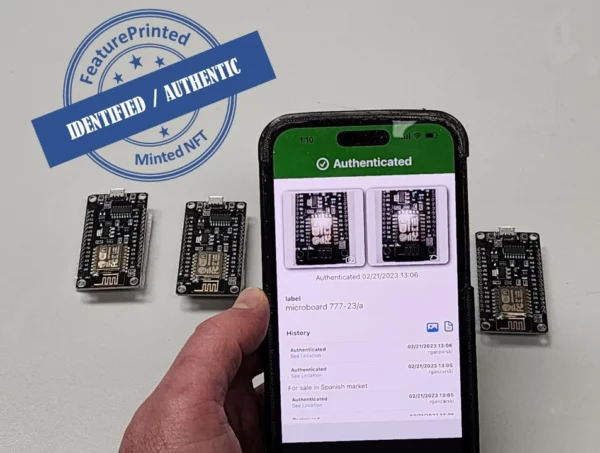The Provenance Chain Network and SIMBA on stage at North American BlockChain Summit to talk about everything but Crypto
Portland, OR – The Provenance Chain™ Network Inc. (PCN) is excited to partner with SIMBA Chain to share how the using Blockchain technologies helps with National Security.
The PCN and SIMBA will be part of the panel discussion “The Chain of Command: National Security in the Digital Age”; represented by Jeff Gaus, CEO of PCN, Ian Taylor, CEO of SIMBA; joining them is Adam Schafer, Head of Supply Chain Strategy for the CHIPS Program Office. This panel, taking place at the North American Blockchain Summit on November 16, in Fort Worth, Texas, will explore the role of industrial policy, public-private partnerships, and National Security.
Typical Blockchain conferences focus on FinTech, Bitcoin Mining, or other typical Crypto topics. Over half of the agenda this year is covering non-crypto topics. This is evidence that Blockchain is much more than digital currency.
“We are honored to share the stage with Adam Shafer from Commerce and Ian Taylor from SIMBA Chain to explore how this emerging technology is impacting our lives, our companies, and this Nation’s national security,” says Jeff Gaus, CEO The Provenance Chain Network. “With what Secretary Gina Raimondo is doing with the CHIPS and Science act, we’ve begun an industrial renaissance unlike anything this country has ever done. It’s exhilarating having a front row seat with our public and private partners in this mobilization.”
Ian Taylor, CEO of SIMBA, describes his company as “SIMBA is to Data, as what Docker is to Containers. “
Learn more about the North American Blockchain Summit here.
About the Provenance Chain™ Network Inc.
PCN’s supply chain transparency solution is a dual use technology that combines three core components:
Digital Supply Chain – digitizing all critical components of a supply chain, primarily the People, Places, and Products within an organization – creating their digital assets. The platform is flexible to integrate with existing data management systems to consolidate and connect supply chain data wherever it lives.
Transactional Framework – utilizing a standard framework by which network participants share key data via commercial transactions. This framework provides selective disclosure to shared information, limited to the parties engaged in the transaction. These permissions are easily manageable by the data property owner. Through this recursive structure, network participants can request, receive, and validate key information about people, places, and things from any tier of their supply chain using existing business transactions while also protecting data security.
Permissioned Blockchain – immutably capture information and activity by and between known parties. Distributed Ledger Technology (DLT) ensures that all data is stored securely, with access strictly limited to appropriate users. DLT facilitates the sharing of data between partners while enabling the protection and preservation of IP and maintaining an immutable auditable trail of activity for all network participants. Data security and auditability are critical to facilitate network enrollment and participation.
For more information, visit www.theprovenancechain.com
Constellation Network and SIMBA Partner to Communicate Data Interoperability Using Multiple Blockchains for the U.S. Air Force
SAN FRANCISCO, May 18, 2023 Constellation Network, a decentralized network and Web3 blockchain ecosystem, today announced a strategic partnership with SIMBA Chain—a cloud-based, multi-blockchain enterprise development platform. As Constellation enters their next historic blockchain contract with the U.S. Air Force, they were tasked with selecting a chain agnostic and open blockchain framework to bring into the effort. While the Department of Defense (DoD) sees smart contract functionality as paramount, Constellation wanted to align with a trusted, flexible, extensible, and enterprise ready solution.
During this contract effort, Constellation Network and SIMBA Chain will produce a bridge demonstrating blockchain data interoperability in a simulated DoD environment using the Constellation Network Layer 0 (L0) standard. The L0 will function as a “chain of chains,” supporting feeless data exchanges between blockchains and the capability of redundancy. Specifically, the L0 standard will use other Web3 blockchains for data transport and capability redundancy through a resilient, network fallback. The deliverable is the ability for multiple blockchain networks to securely talk with each other.
In addition to this initiative, Constellation is working with SIMBA Chain in their effort to orchestrate critical mission data using smart contracts to support multi-author data exchange applications for participating federal commercial partners.
In partnering with SIMBA, Constellation will showcase the power of their Hypergraph Transfer Protocol (HGTP) which offers scalable, secure data validation alongside the world class SIMBA Blocks platform, consisting of several industry leading blockchain protocols. “We’ve been tracking the commercial and federal momentum SIMBA Chain created over the last four years and they have successfully positioned themselves as a mission critical, enterprise ready solution for the public sector” said Benjamin Diggles, Chief Strategy Officer, and Co-Founder of Constellation Network. “We have great respect for their team and the quality of what they have built which made this partnership an easy decision. SIMBA’s commitment to federal and enterprise excellence along with their demonstrable track record makes this partnership a perfect match.”
“SIMBA Chain’s start came from a DARPA grant – and we’ve continued to work with different Department of Defense agencies on solving unique problems using blockchain. We are looking forward to expanding this effort and working with Constellation to provide a blockchain agnostic environment” said Ian Taylor, Chief Executive Officer, and Co-Founder of SIMBA Chain. “This is just the beginning of our collaboration with Constellation Network on bringing blockchain to the public sector.”
This joint effort is one of many indicators that the federal government no longer sees blockchain and decentralization as a nice-to-have but mission-critical. With pressures building from the commercial space for the Department of Defense to adopt Web3 solutions, this partnership represents a significant step in the adoption transition.
About Constellation Network, Inc.
Constellation Network is an open-source framework allowing everyone to build and conduct a business on Blockchain.
SIMBA Chain and Alitheon Partner to Deliver End-to-End Authentication & Verification
SIMBA Chain, the builder of Blocks, an enterprise-grade platform that abstracts the complexities of blockchain development to make the innovative technology more accessible across multiple blockchains and services, today announces the integration of Alitheon, the provider of FeaturePrint®, the machine-vision based solution for authentication and traceability of physical goods.
The go-to-market partnering agreement enables Alitheon to provide its customers with the ability to certify the authenticity and take ownership of digitized physical items using the blockchain-based FeaturePrint® system. SIMBA will extend Alitheon’s FeaturePrint to its own customer base, allowing them to first authenticate, and then trace, physical products through the entirety of their commercial lifecycle.

FeaturePrint® allows for immediate authentication of an item using a smartphone using an advanced optical AI technology that digitizes items. SIMBA provides the infrastructure to enable the omnipresent tracking of real-world items through the blockchain by tying each physical item issued by a manufacturer to a unique NFT which acts as the item’s digital twin. From here, both the NFT and the item can be tracked from warehouse to customer to second-hand buyer and beyond, eliminating the possibility of replication, fraud or counterfeiting.
Bryan Ritchie, CEO of SIMBA Chain, said: “The global gray and black market and counterfeiting industry has proven to be highly resistant to modern day technical solutions designed to curb the problem, while physical policing simply cannot match the scope and scale of the issue. By registering and digitizing physical items on the blockchain we can create an immutable public record of each item, and then follow its path from retailer to customer and beyond.”
Using NFTs to represent physical items on the blockchain enables industrial materials like aircraft and automotive parts to be tracked in real-time through the supply chain, effectively eliminating risks associated with counterfeit parts or inadequate maintenance. Blockchain technology can also be used by diamond producers to confirm the quality and ethical sourcing of their precious stones using immutable data which proves the origin of the gemstones.
SIMBA Chain provides governments and enterprises with interconnective blockchain-based solutions to address a number of areas, including supply chain management, financial accountability, medical data processing, and manufacturing lines. SIMBA recently ported the parts supply chain for Boeing’s F/A-18 combat aircraft onto its blockchain-based system, cutting time consuming paperwork costs by 40%, and reducing parts waste by 15%.
In industries spanning aviation, automotive manufacturing, pharmaceuticals, luxury goods, and collectibles, counterfeiting and gray market activity poses an estimated $4.5 trillion annual challenge to brands and manufacturers. These activities have negative impacts on revenue, brand integrity, and, in some cases, the security and well-being of customers.
The Alitheon SIMBA offering presents undeniable authentication of the physical item, coupled with an immutable ledger for storing ownership and other essential data. This ensures that any sales, upgrades, and maintenance activities are safely recorded for the entire lifespan of the item’s usage. The transparency and immutability provided by this solution surpasses current solutions, including certificates of authenticity, guaranteeing end-to-end verification and security for both the physical and digital aspects of the product that can’t be altered by anyone on the network.
About Alitheon
Alitheon® is a Bellevue, Washington-based leader in advanced optical AI and creator of FeaturePrint®, a patented system connecting the physical and digital worlds via a secure and immutable link. FeaturePrint digitizes for items and products, what fingerprints are for people – a one of a kind, unique identifier that does not require you to mark, modify or add anything to the item. Using just a camera, FeaturePrinting enables authentication, identification, and traceability of individual items out of millions of similar objects. With FeaturePrint, counterfeits are avoided, misidentification of parts is eliminated, and the use of wrong products is minimized. FeaturePrint is currently used for numerous track, trace, and authentication purposes across automotive, pharmaceuticals, aerospace & defense, medical equipment, precious metals, and luxury goods & collectibles.
Media Contact:
alitheon@missionc2.com
SIMBA Chain Awarded $30M U.S. Air Force STRATFI
SOUTH BEND, IN – Leading enterprise blockchain solutions provider SIMBA Chain announces it has been selected for a $30M STRATFI with the U.S. Air Force (USAF), following up on multiple projects the company has completed for the military branch in recent years.
The USAF STRATFI is focused on identifying and advancing technologies that have the potential to secure its future dominance. The $30M investment reflects a significant budget increase compared to previous blockchain initiatives, and will focus on the development and deployment of blockchain applications in supply chain management. These programs are designed to be used by the Office of the Undersecretary of Defense for Research & Engineering, the USAF, U.S. Navy, U.S. Army, and the Defense Logistics Agency.

Commenting on the new partnership, Stacy Betlej-Amodeo, Vice President of Government Operations at SIMBA Chain, elaborates “Our new project for the USAF will pave the way to more efficient and comprehensive management of assets within the Department of Defense supply chain. SIMBA is thrilled to build upon our existing partnership with the DoD to scale blockchain technology across the enterprise.”
Previously, SIMBA Chain has developed various blockchain applications to improve crucial USAF activities, including the tokenization of the organization’s budget to enhance accounting, as well as the tracking of critical components vital to the air service branch. The STRATFI will significantly accelerate development of the SIMBA Blocks platform while delivering in-transit visibility that supports the USAF strategic mission.
“Through STRATFI our Government partners are sending a strong demand signal for blockchain technology. Given the interconnectedness of the DOD supply chain, it also signals an opportunity to collaborate and increase adoption within the commercial industry.” says Bryan Ritchie, CEO of SIMBA Chain, of the opportunity.
About SIMBA Chain
Incubated at the University of Notre Dame in 2017, SIMBA Chain (short for Simple Blockchain Applications) is a fully integrated development platform that government agencies use to bridge and connect to Web3. SIMBA Blocks is at the core of this offering, abstracting the complexities of blockchain development to make Web3 accessible to all.
SIMBA Blocks is a fully integrated platform that addresses governments’ unique challenges when implementing blockchain-based solutions. From resilient information sharing and rapid decision-making to military supply chains, SIMBA’s exceptional network performance and robust security features safeguard government data systems.
The robust platform delivers a low-configuration environment that auto-generates REST APIs capable of connecting to smart contracts on multiple blockchain protocols. With the ability to choose and migrate between public, private, and hybrid chains, governments can optimize their blockchain applications while future-proofing Web3 investments. Most importantly, as a government-proven platform, SIMBA Blocks ensures blockchain-based applications interact seamlessly with legacy systems across public and private domains.
General Services Administration Awards Multiple Award Schedule Contract To SIMBA Chain
SOUTH BEND, Ind. – The Air Force Installation Contracting Center (AFICC) and SIMBA Chain have formed a historic partnership through a Basic Ordering Agreement (BOA) that allows Federal agencies to access SIMBA Chain’s Phase III Small Business Innovation Research (SBIR) capabilities via the AFICC.
Through the new BOA, which extends through March 2024, Federal clients seeking detailed data support for decision-making can swiftly access SIMBA Chain’s state-of-the-art web3 development platform. The proprietary software enables users to build highly reliable and versatile blockchain-based applications using traditional programming practices.
SIMBA Chain is effectively used by enterprises and government organizations to develop applications for areas such as:
- Supply Chain Management
- Financial Accountability
- Medical Data
- Manufacturing
In the words of Bryan Ritchie, CEO of SIMBA Chain, “This BOA is a game-changer for Federal agencies, as it streamlines the process of accessing SIMBA Chain’s Phase III SBIR capabilities. We have enjoyed collaborating with AFICC to establish this BOA and appreciate their efforts to make sophisticated blockchain technology accessible to all Federal agencies.”
Since its establishment, SIMBA Chain has been at the forefront of developing cutting-edge blockchain solutions for various branches of the US military, federal departments, and corporations such as Boeing. These solutions have proven to be highly effective in streamlining supply chain management, increasing accountability and strengthening financial oversight, all while reducing costs associated with intermediaries and development. With the recent award of the BOA, an even wider range of government agencies will be able to improve their operations and gain unparalleled visibility into their supply chains and financial operations.
General Services Administration Awards Multiple Award Schedule Contract To SIMBA Chain
After securing over fourteen contracts with the Department of Defense and other federal departments since 2017, the US General Services Administration (GSA) has awarded SIMBA Chain, the leading blockchain enterprise service, a Multiple Award Schedule (MAS) contract. This long-term, government-wide contract permits SIMBA Chain to supply its blockchain solutions and services to all Federal US agencies for up to 20 years.
With this move, SIMBA Chain has become one of the first blockchain service providers approved by the GSA. The first-of-its-kind contract will allow the company to expand its business across the public and private sectors, creating opportunities to expand the reach and impact of blockchain technology as an enterprise solution.
The GSA is an increasingly important independent agency of the US government. Its MAS contracts aim to provide federal, state, and local governments with access to products and services deemed as fair and reasonable. As of 2022, the agency accounts for over $40 billion in annual contract spending.
“With this MAS contract, SIMBA has reached a major milestone in the push for blockchain adoption in the Government sector. Being one of the first blockchain solutions listed on the GSA schedule validates our commitment to the application of blockchain technology in government organizations, and will allow us to expand from the DoD and DoE to not only other federal branches of government, but also states, and municipalities. Blockchain can help resolve so many of the challenges within transferring of titles, permit processes, supply chain, monetary management and more”
– Dr. Bryan Ritchie, CEO of SIMBA Chain.
Since inception, SIMBA Chain has built several state-of-the-art blockchain applications for the US Navy, Air Force, Space Force, and other government branches. Each of these solutions has significantly enhanced supply chain management, accountability, and financial oversight while also reducing intermediary and development costs. Thanks to the recently awarded SIMBA Chain MAS contract, more government agencies will have the opportunity to improve their operations while achieving greater supply chain and financial transparency.
SIMBA Chain awarded SpaceWERX Orbital Prime Contract
SOUTH BEND, Ind. – SIMBA Chain announces it has been selected by SpaceWERX for a STTR Phase I in the amount of $250,000 to investigate how SIMBA’s blockchain technology may enable In-space Service Assembly and Manufacturing (ISAM) capabilities being explored by the Department of the Air Force (DAF) and United States Space Force (USSF) through the Orbital Prime program. Orbital Prime was created to accelerate the commercial ISAM market toward a use case of Active Debris Remediation. The Air Force Research Laboratory and SpaceWERX have partnered to streamline the Small Business Innovation Research (SBIR) and Small Business Technology Transfer (STTR) process by accelerating the small business experience through a faster proposal to award timelines, changing the pool of potential applicants by expanding opportunities to small business and losing bureaucratic overhead by continually implementing process improvement changes in contract execution. The DAF began offering ‘The Open Topic’ SBIR/STTR program in 2018 which expanded the range of innovations the DAF funded and now on July 29, 2022, SIMBA Chain will start its journey to create and provide innovative capabilities that will strengthen the national defense of the United States of America.
About AFRL
The Air Force Research Laboratory (AFRL) is the primary scientific research and development center for the Department of the Air Force and United States Space Force. AFRL plays an integral role in leading the discovery, development, and integration of affordable warfighting technologies for our air, space, and cyberspace force. With a workforce of more than 11,000 across nine technology areas and 40 other operations across the globe, AFRL provides a diverse portfolio of science and technology ranging from fundamental to advanced research and technology development. For more information, visit: afresearchlab.com.
About SpaceWERX
SpaceWERX is the Space component of AFWERX (a program office at the Air Force Research Laboratory -AFRL) which connects innovators across government, industry and academia. Through innovation and collaboration with our nation’s top subject-matter experts and harnessing the power of ingenuity of internal talent, by expanding technology, talent, and transition partnerships for rapid and affordable commercial and military capability. Additional information is available at: spacewerx.us/.
About SpaceWERX Orbital Prime
SpaceWERX Orbital Prime leverages a diverse industry partnership engagement strategy to identify nascent space technology sectors that, if “primed”, could advance U.S. national security and economic prosperity. Prime engagement is not limited to government investment, but also allows SpaceWERX to address key policy concerns as well as offer testbeds and platforms to advance capabilities. The first Space Prime effort, Orbital Prime will invigorate the In-space Servicing, Assembly, and Manufacturing (ISAM) market using Active Debris Remediation (ADR) as a use case for the foundational technologies. Learn more at spacewerx.us/space-prime/
SIMBA and Equideum Health to Build Web3 Health Data Exchange
South Bend, IN – SIMBA Chain is announcing a new partnership for the global healthcare and life sciences industry with Equideum Health, the Web3 and blockchain-powered health company formerly known as ConsenSys Health. The collaboration aims to significantly enhance global healthcare by building a decentralized marketplace, dubbed the Equideum Exchange, for empowering individuals to monetize health and health-relevant data about them.
Integrating SIMBA Chain’s cutting-edge blockchain solution SIMBA Blocks with Equideum Health’s Elevated ComputeTM platform will greatly accelerate both cross-blockchain interoperability and the incorporation of healthcare and life sciences supply chain data into the new Web3 data economy enabled by the Equideum Exchange. The development of the Equideum Exchange is expected to conclude by Q1 2023 in collaboration with Equideum Health’s current partners Nokia, Nokia Bell Labs, Microsoft, Intel, and ConsenSys. Users of the Equideum Exchange – including pharmaceutical and medtech companies, and public and global health authorities – will be able to procure data and privacy-preserving analytic compute results for clinical, population health, health economic, patient-centered outcomes research and machine learning purposes. These users will be able to access a growing array of high-integrity, longitudinal data resources unavailable today, accompanied by the fine-grained, verifiable, and enforceable consent and economic participation of the individual data subjects.
The integration of SIMBA Blocks enables Equideum Health to achieve cross-blockchain protocol interoperability across its health data applications seamlessly and with significant cost savings. All user data provided remains completely decentralized and anonymous unless a user explicitly consents to be identified, while users also have the option to set certain conditions for the use of their data, such as time limits or purposes, which are ensured through smart contracts and Equideum Health’s enterprise-facing consumer-centric data policy verification and enforcement tools.
The health data platform is part of Equideum Health’s advancement of the Health 3.0 paradigm, also referred to as “Ownership Health,” which is an extension of the read-write-own concept of Web3. The vision sees health and health-relevant personal data used to deliver precision healthcare tailored to the data subject and also controlled and monetizable directly by that data subject. This allows individuals to profit economically from transactions involving data about them while curating much higher-quality data with verifiable provenance for scientific and global health purposes.
“We are proud to be part of a big advancement of the global healthcare system powered by blockchain technology. The use of SIMBA Blocks in the Equideum Exchange’s development will provide a secure and trusted environment to build interoperable cross-blockchain solutions for longitudinal health data, automated health claims adjudication, interoperability, online patient access and supply chain management. With Equideum Health as our new lead partner for healthcare and life sciences, SIMBA Chain ventures into a new industry that is expected to yield many valuable projects in the months and years to come,” says Bryan Ritchie, CEO of SIMBA Chain.
“Adding SIMBA Chain as our lead partner for blockchain-based supply chain initiatives unlocks strategic value at a critical moment: the COVID-19 pandemic has aligned healthcare and life sciences leaders across the public, private, and philanthropic sectors on the urgency to re-architect global supply chains for resilience, adaptability, security, and health equity,” says Heather Leigh Flannery, Founder and CEO of Equideum Health. “Further, by integrating our platforms, our partnership addresses one of the industry’s biggest barriers to adoption of blockchain technology: the deep concern that decentralized applications written for one blockchain ecosystem will not be interoperable cross-chain. Instead of remediating challenges with siloed, poorly utilizable data, this could create still more data silos. Our industry continues to contend with the legacy of non-interoperable electronic health records; it is vital that new exponential technology layered above doesn’t compound the problem.”
About Equideum Health
Equideum Health (formerly ConsenSys Health), a Microsoft and ConsenSys partner and ConsenSys Mesh portfolio company, builds Web3 person-centered healthcare and research networks called Data Integrity and Learning Networks (DILNs). DILNs feature self-sovereign identity, fine-grained verifiable consents, advanced privacy preservation and decentralized data liquidity across enterprise and individual data silos. DILNs are implementations of the company’s Elevated ComputeTM platform, powered by Ethereum, tokenization, decentralized artificial intelligence (AI), and confidential computing. Equideum Health’s DILNs prioritize populations with uniquely complex healthcare needs and aim to improve population health and clinical outcomes by impacting access, equity, quality, personalization, engagement and empowerment.
Learn more at equideum.health.
Making Building on the Blockchain Easier Than Ever with SIMBA Blocks
SIMBA Chain, the leading provider of blockchain enterprise solutions, has released its new blockchain cloud service, SIMBA Blocks. The intuitive platform allows organizations to interact with familiar Web2 interfaces while tapping into decentralized Web3 infrastructure and all of its benefits, including transparency, accountability, and monitoring. From supply chain management to building NFT marketplaces, SIMBA Blocks allows anyone to integrate blockchain solutions into their projects seamlessly.
To simplify the integration of blockchain solutions into traditional organizations, SIMBA Blocks provides a user-friendly web interface for effective monitoring and administration. The cloud service platform also offers a drag-and-drop smart contract development that enables developers, universities, companies, and other organizations to quickly and efficiently build Web3 solutions. The data models created by the smart contract designer are made searchable by GraphQL directly in the SIMBA Blocks UI.
Users can seamlessly migrate between different blockchain protocols, allowing them to stay agile and adaptive to project changes. This flexibility ensures that clients can always select the best solution for their unique needs.
Additionally, by auto-generating virtual REST APIs connected to smart contracts, SIMBA Blocks seamlessly converts all API requests to blockchain transactions. These REST APIs support public and private blockchain deployments and can communicate with different protocols to facilitate powerful integrations.
Already in use by entities like the US Air Force and The National Institute of Standards and Technology, SIMBA Blocks delivers solution-specific modules optimized for multiple use cases, including tokenization, NFTs, and supply chain management. In addition, SIMBA’s underlying infrastructure distributes network activity across multiple nodes to manage network congestion, ensuring client transactions are always successful.
Crucially, organizations can use the cloud service to conveniently deploy blockchain applications without spending a substantial amount of time or money on external consultants or experts. Its intuitive, user-friendly design and robust features allow Web2 businesses to integrate blockchain technologies without going through a restrictive and expensive development process.
“SIMBA Blocks makes building Web3 applications easier, faster, and cheaper. Instead of the process taking months to years before production can start, brands can deploy blockchain solutions within days to weeks. Moreover, thanks to its built-in security and monitoring features, SIMBA Blocks enables users to integrate both Web2 and Web3 applications to maximize the software’s use-cases,” says Bryan Ritchie, CEO of SIMBA Chain.
In addition to the currently-supported Polygon, Tezos, Ethereum, and ConsenSys Quorum blockchains, SIMBA Blocks will expand to support more protocols and SDKs as part of its roadmap.
SIMBA Chain to Build Blockchain Backed Local Health Supply Chain System for MxD
SIMBA Chain, Inc., a chain-agnostic API development platform providing pathways to Web3 for cloud-based Web2 companies, has announced its intent to build a Local Health Alert System to conduct contact tracing and data analysis on-chain, translating real-time public health indicators into future demand signals to develop predictive capabilities for supply chain needs.
The Local Health Alert System contributes to a wider public health campaign, spearheaded by MxD, the national digital manufacturing and cybersecurity institute, and supported by a $6.25 million award from the National Institute of Standards and Technology (NIST), part of the U.S. Department of Commerce. The campaign’s mission is to establish a rapid response medical goods supply chain marketplace and to advance data analysis to track future demand signals.
Utilizing SIMBA’s proprietary technology, the system will employ blockchain technologies including zero knowledge proofs, verifiable credentials, and distributed IDs to build a decentralized and privacy-preserving system that will fuel an online marketplace for consumers and manufacturers of emergency health and medical goods. The application will integrate with leading edge health monitoring wearable technology applications to detect disease earlier, enable earlier and higher-resolution demand signals, and provide additional value to consumers and the health care sector.
“The Local Health Alert System is the ideal scenario to apply secure, accessible blockchain technology, where functionality like immutability, transparency and security are absolutely critical,” said Joel Neidig, co-founder of SIMBA Chain. “Facilitating a real-time connection between active public health data and the supply chain status will enable companies to more efficiently produce and deploy medical supplies in future health crises.”
Federico Sciammarella, MxD President and Chief Technology Officer, added, “This partnership will enable MxD and SIMBA Chain to put the tools in place for more agile supply chains across the public health sector.”
About MxD
MxD (Manufacturing x Digital) is where innovative manufacturers go to forge their futures. In partnership with the Department of Defense, MxD equips U.S. factories with the digital tools, cybersecurity, and workforce expertise needed to begin building every part better than the last. As a result, our more than 300 partners increase their productivity, win more business, and strengthen U.S. manufacturing. MxD is also the National Center for Cybersecurity in Manufacturing as designated by DoD.
Polygon Taps SIMBA Chain for Upcoming Blockchain Business Initiatives
SIMBA Chain, Inc., a chain-agnostic API development platform providing pathways to blockchain technology for cloud-based technology companies, has announced that it will integrate with Polygon, the leading platform for Ethereum scaling and infrastructure development, in
efforts to further enhance blockchain technology adoption and innovation.
To date, SIMBA Chain and Polygon have independently served as technology platforms enabling scalable blockchain connectivity among centralized and decentralized entities. Polygon’s selection of SIMBA Chain to collaborate on a wide variety of business use cases and opportunities moving forward will offer both ecosystems an expanded network of infrastructure, resources, and support.
The integration will allow both SIMBA Chain and Polygon to continue lowering the entry barriers of decentralized app development to non-crypto users and opening doors for more businesses to engage in blockchain technology infrastructure.
“Many of our clients from the traditional enterprise and cloud-based technology space expect the same scalability, speed and simplicity in blockchain development that they enjoy in their current development tools. By working with Polygon, SIMBA Chain is able to offer customers innovative blockchain solutions with the requirements and expectations they have of any enterprise tech stack – and still leverage the benefits of Ethereum’s market.” said Bryan Ritchie, CEO of SIMBA Chain.
SIMBA Chain will utilize the full-stack scaling solution as the go-to infrastructure on which to build and run custom, white-label NFT Marketplaces for their customers. A variety of brands, ranging from entertainment and sports to institutionalized entities, have already approached SIMBA, seeking cost-effective, low-to-no code, NFT solutions. While SIMBA Chain thus far has been able to successfully provide customers with those solutions, its integration with Polygon will greatly propel the efficiency and effectiveness of each new and existing white-labeled marketplace.
Outside of the white-label NFT marketplace development, SIMBA and Polygon will also seek to market and widely integrate SIMBA’s metadata registry bridge (MDR), with aims of enhancing secure digital asset custody solutions through widespread interoperability. As the blockchain technology ecosystem matures and expands, SIMBA and Polygon intend to collaborate on a number of future NFT projects that will provide mutually beneficial enhancements to both ecosystems.
In addition to Polygon, SIMBA Chain also supports Ethereum, Quorum, Stellar, RSK, Binance, Avalanche, Hyperledger Fabric, and Hyperledger Sawtooth, amongst other protocols, and will continue to expand multichain decentralized App development capabilities.
About Polygon
Polygon is the leading platform for Ethereum scaling and infrastructure development. Its growing suite of products offers developers easy access to all major scaling and infrastructure solutions: L2 solutions (ZK Rollups and Optimistic Rollups), sidechains, hybrid solutions, stand-alone and enterprise chains, data availability solutions, and more. Polygon’s scaling solutions have seen widespread adoption with 7000+ applications hosted, 1B+ total transactions processed, ~100M+ unique user addresses, and $5B+ in assets secured.
If you’re an Ethereum Developer, you’re already a Polygon developer! Leverage Polygon’s fast and secure txns for your dApp, get started here.
SIMBA Chain Acquires StrongSalt
SIMBA Chain, Inc., an Application Programming Interface (API) development platform that helps enterprise companies build technology on blockchain, has announced its acquisition of privacy and storage company, StrongSalt.
The acquisition of StrongSalt will enable SIMBA Chain — the leading connector to Web3 for Web2 businesses — to scale its privacy and secure storage-focused offerings, while fully integrating high-performance data functionalities for its customer base, marking a major step forward for the future of security within blockchain technologies.
SIMBA Chain will first focus its newly enhanced privacy efforts on its robust non-fungible token (NFT) product suite. NFTs are becoming a vehicle to widespread adoption of blockchain by legacy tech companies, but current privacy issues and insufficient security within the space have so far hindered widespread adoption. StrongSalt’s patented technology will address this issue by allowing sensitive NFT data to be searched and accessed without compromising the privacy of the information. This enhances the security of NFTs stored on SIMBA Chain’s platform, and helps expand the application opportunities for digital assets with privacy.
The increased privacy and secure storage solutions for NFTs across the SIMBA platform will open the doors for a broader range of NFT-driven use cases – including but not limited to enhanced healthcare data privacy, secure messaging platforms for government agencies and highly classified projects, and added digital asset and IP protection for next-generation gaming platforms.
“Acquiring StrongSalt gives SIMBA a critical capability to provide both privacy and storage in a way that does not disturb the scalability of our platform, and most importantly, ensures our Web2 partners that interacting with Web3 technologies can be exceptionally secure,” said Bryan Ritchie, CEO of SIMBA Chain.
SIMBA Chain, founded in 2017, has built a Web3 infrastructure development platform autogenerating an extensive family of APIs that support a large sum of blockchains, allowing customers to launch blockchain applications without hiring costly consultants or consuming valuable tech expertise. Operating with a wide variety of audiences, including NFT platforms, government, education, gaming, and enterprise, the SIMBA Chain platform allows for a level of flexibility and customization unmatched by simply building an application on a traditional blockchain.
“The moment StrongSalt met with the SIMBA team, we realized the opportunity our teams had to collectively offer a solution unmatched by any market competitor,” said Paul Lung, Chief Technology Officer of StrongSalt. “This acquisition will integrate our infrastructures to provide a high-quality pathway for Web2 organizations to achieve privacy and security afforded by Web3 technologies. We cannot wait to be a part of building the future of the Internet alongside SIMBA.”
About StrongSalt Inc.
StrongSalt is an encryption and storage platform that helps build a new privacy infrastructure for the internet. StrongSalt is solving the fundamental problem of data privacy by building the world’s first always-on searchable encryption infrastructure through APIs that are simple enough for any developer to use, yet secure enough to power the world’s most demanding applications.
SIMBA Provides PrairieDog Blockchain for Construction Solutions
SOUTH BEND, Ind., September 7, 2021 – With the U.S. Senate passage of the infrastructure bill, the construction industry outlook is bright. In a February 3, 2021, Moody’s Investor Report, it was stated that a “multiyear federal infrastructure investment bill will boost U.S. construction spending growth by about 200 basis points 9-12 months after being passed.”
The news about the potential construction growth is music to the ears of PrairieDog, a novel construction innovation hub and technology provider. In August of 2021, the company began working with blockchain innovator SIMBA Chain to develop smart contract-based solutions that help the construction industry eliminate transactional waste by improving traditional business processes, removing contentious contracts, and embracing digital transformation.
SIMBA’s platform, which has been embraced by the U.S. Government, businesses, and academia, was deployed by PrairieDog to create smart contract-based solutions which can be applied to traditional two-party or multiparty construction contracts.
PrairieDog CEO, Pete Dumont, said, “Our industry generally suffers from around 5% ‘contract leakage,’ costly claims and disputes, and inefficient contract administration work processes. The invoicing process is still largely manual. We need transactional certainty.”
Smart contracts help capture the payable events digitally, process transactions and payments automatically, record them on an immutable blockchain, provide a single source of truth for all parties, and reduce transactional waste. By applying smart contracts, parties have far fewer items to dispute. With smart contracts, companies can pay as quickly as net 1-day if they so choose.
Dumont believes, “We must recognize that late payments are a cancer in our industry driving in an average of 3-5% cost growth on projects. Why are engineers, suppliers, and contractors treated like lenders by subjecting them to 60-day, 90-day, or worse payment terms? The high cost of capital compounded in a tiered supply chain is one of the largest sources of transactional waste in capital projects.”
“SIMBA’s platform provides PrairieDog with a user-friendly, repeatable, and scalable approach to creating smart contracts that automate payments, eliminate human error, and avoid disputes,” says David Wasson, SIMBA Chain’s Director of Enterprise Business Development. “The smart contracts will provide an opportunity for faster payments which may incentivize stakeholders to improve both the construction schedule and quality which can translate into cost savings,” Wasson added.
Dumont concludes by saying, “Construction is one of the largest industries in the world, and it’s also one of the most inefficient and slow to adopt new technologies. Blockchain will enable a new economy for capital projects based on trust and transparency. Blockchain is an equalizer, delivering a necessary ‘single source of truth.’ Blockchain technology is here to stay, and first movers in this space will leave traditional competitors behind.
About PrairieDog
PrairieDog is applying proven smart contract technology to bring immediate value to capital projects in service of a greater mission to create a new market network for the construction industry – one based on transparency and fiduciary relationships. The PrairieDog leadership team consists of construction industry experts who share their vision with their collaborators involved in the Operating System 2.0 (OS2) initiative led by the Construction Industry Institute (CII) and the Construction Users Roundtable (CURT).
SIMBA Chain Raises $25 Million in Series A
SOUTH BEND, Indiana (September 3, 2021) – SIMBA Chain, the technology company that has eliminated the complexities of blockchain app development and reduced energy usage thus opening the door to a world of users, has closed a $25 million Series A funding round led by Valley Capital Partners. The round received additional participation from the Notre Dame Pit Road Fund, Elevate Ventures, Stanford Law School Venture Fund, and individuals affiliated with Kohlberg, Kravis & Roberts (KKR), Amazon, Apple, Facebook, SpaceX, Gap, Estee Lauder, AppLovin, Microsoft, Moelis & Company, Stanford University, the Golden State Warriors, the founders of Lightspeed Venture Partners and New Enterprise Associates and other individual investors.
SIMBA Chain, a startup incubated at the University of Notre Dame, offers a simple, time and energy efficient method for deploying blockchain technology in the most secure and complex environments. Its state-of-the-art technology autogenerates a robust family of APIs that support permissioned and public blockchains, allowing customers to launch blockchain applications without hiring costly consultants or consuming valuable tech expertise. And, because SIMBA Chain allows users to select from a wide range of blockchain technologies, with portability across these chains, the company provides a level of flexibility and customization that traditional blockchain approaches cannot support.
SIMBA’s CEO and co-founder Joel Neidig stated, “Demand for our Web3 smart contracts platform has accelerated across all of our markets much quicker than we anticipated. Users across multiple spectrums have embraced and validated the SIMBA Chain model, which simplifies development of smart contracts. The market has also responded positively to our support of multiple blockchains, including Ethereum, Avalanche, RSK, Stellar, and many others, making SIMBA Chain-based applications simple, highly portable and sustainable.” SIMBA Chain’s technology is currently used by Fortune 500 companies as well as other multi-billion-dollar organizations.
Steve O’Hara, managing partner at Valley Capital Partners of Menlo Park, California, said, “Since its founding in 2017, SIMBA Chain has distinguished itself by solving the incredibly hard problem of making blockchain technology, which is inherently complex and difficult to master, accessible to literally anyone who wants to realize the advantages blockchain has to offer. Thanks to the intellectual depth and insatiable curiosity of its team, SIMBA Chain has succeeded in establishing impressive beachheads in the defense and enterprise markets – a rare thing to see in emerging frontier technologies like blockchain. We are excited to support SIMBA Chain at this pivotal time.”
With the additional funding, SIMBA Chain plans to scale sales, marketing, and development, and to dedicate resources to emerging enterprise level opportunities such as non-fungible tokens. SIMBA Chain expects business enterprises, academic institutions, and others will use its software to manage and monetize digital and physical assets as well as to launch business models that don’t exist today.
“This is one of the more exciting blockchain companies I’ve seen in a while,” observed Joseph Grundfest, a Stanford Law School professor, former commissioner of the Securities and Exchange Commission and member of Stanford’s Center for Blockchain Research. “SIMBA Chain solves a very big problem; most companies don’t know how to adopt or manage blockchain technology. SIMBA Chain makes that easy and cheap, so it’s a bit like Stripe for the blockchain. Also, by writing on energy-efficient blockchains, SIMBA Chain’s ‘green solution’ responds to concern that some blockchains contribute to global warming.”
Despite the past year’s economic disruptions, SIMBA Chain has remained laser focused on unleashing blockchain’s potential for enterprise, government, and education as the first examples of what will certainly be numerous use cases. Over the last 18 months, SIMBA Chain has achieved the following milestones:
- Grown revenue by 360 percent.
- Closed paid programs with the U.S. Air Force, U.S. Army, U.S. Navy, and U.S. Marine Corp to develop secure, immutable, blockchain-based solutions critical to U.S. national security and warfighter effectiveness.
- Secured contracts with more than 30 institutions of higher learning in the United States, United Kingdom and Australia that are using the SIMBA Chain platform in their schools of business and law.
- Surpassed 6,000 users.
- Developed a digital marketplace using non-fungible tokens for a major university.
Joining the SIMBA Chain Board of Directors are Steve O’Hara, Valley Capital Partners; Phil Koen, former CEO of Savvis and Intermedia, and former president of Equinix; and Mike Lempres, former EIR at Andreessen Horowitz, and former chief legal and risk officer and Board of Directors member, Coinbase.
Said Neidig, “The entire SIMBA Chain team is elated by this new investment and what it represents. We are grateful to everyone who has recognized our potential, and we look forward to the future.”
SIMBA Chain Brings High Value Jobs to Blaenau Gwent
Welsh Economy Minister Vaughan Gething today announced that American cloud-based tech company SIMBA Chain is due to set up a base in Ebbw Vale following Welsh Government support through its Tech Valleys programme, creating 26 well-paid, highly skilled jobs.
Founded in 2017 with a grant to develop a secure, un-hackable messaging and transaction platform for the United States military, SIMBA Chain has quickly established itself as a leader in its field.
It now has high-value contracts with the US Department of Defense, US Air Force and US Navy, and it’s thought SIMBA Chain could become the first unicorn company to emerge from the University of Notre Dame. This would see it achieve a $1 billion valuation.
The move to Wales will see the business benefitting from funding of £737k to ensure the creation of 26 new, highly skilled and well paid jobs. The support is part of the Welsh Government’s £100m Tech Valleys programme, which was established to support high value, sustainable jobs, attract investment and create new opportunities in Blaenau Gwent and the surrounding areas.
The Welsh Government support will further support SIMBA Chain’s global expansion plans to become the go-to name for effectively utilising Blockchain technology.
The 26 new jobs will have an average salary of £60,000.
Economy Minister Vaughan Gething said:
“Through our ambitious Tech Valleys programme we are committed to attracting, supporting and driving innovative tech businesses in Blaenau Gwent and the surrounding areas.
“I am delighted SIMBA Chain has seen the huge potential of this area and has decided to base its operation in the tech-rich ecosystem we are building.
“We want to see long term economic prosperity for residents and these well-paid, highly skilled new jobs are exactly the sort of employment opportunities we want to support. I wish SIMBA all the best in its global expansion plans.”
SIMBA Chain CEO Joel Neidig said:
“We are pleased to make Wales the home of our first international office, which will help expand SIMBA Chain’s presence among corporations, government entities, and universities that want to leverage the unquestionable benefits of blockchain technology not only in the United Kingdom, but across Europe as well.
“Demand for our Web3 smart contracts platform, which enables has accelerated much quicker than we anticipated. Users across multiple spectrums have embraced and validated the SIMBA Chain model, which simplifies development of smart contracts. This partnership will also allow us to tap into the local tech talent we need to support the company’s rapid growth.”
Cardiff University professor Dr. Ian Taylor, who is recognised among the world’s top blockchain influencers, is the co-founder and Chief Technology Officer of SIMBA Chain. He said:
“It is an honour to create opportunities in Wales for those who have a passion for blockchain technology, which is the future of digital information security and value creation and the source of exciting careers.
“SIMBA Chain is literally changing the world by making this highly complex technology easy to use and apply across all major blockchain platforms. Being born in Wales, I am so proud to see our company establish an entity in Wales and help support a new vibrant tech savvy Welsh economy.”
Queens College Partners with SIMBA Chain for Blockchain Education Program
NEW YORK — A campus of the largest urban university in the United States has partnered with blockchain and Web 3.0 platform SIMBA Chain to improve their blockchain education curriculum. Through this partnership, Queens College, a college within the City University of New York (CUNY) will use SIMBA’s intuitive low-code platform to teach students the applications of blockchain and smart contracts without the need to master coding.
Dr. Joan Nix, a professor in the Queens College Economics Department, took a sabbatical in 2018 during which time she found herself interested in cryptocurrencies and wanting to teach a course on the “Economics of CryptoAssets.” Her idea to teach a such a course received acceptance by the Curriculum Committee and went to the Economics department for a faculty vote and later received approval by the Academic Senate.
When the first course was taught in the Spring 2020 semester, the focus was largely on the broad, theoretical concepts of blockchain with little attention on the applied usage for blockchain, but that would soon change.
Dr. Nix says, “I discovered SIMBA through an article in the Chronicle of Higher Education and a webinar co-hosed by SIMBA and Portland State University. I was interested in two areas of expertise: programming and economics. SIMBA’s offer as a platform to experiment on from a conceptual level was very attractive.”
She continues: “Before SIMBA, we had high level discussions about the blockchain. After SIMBA, conversations became more grounded. Talking through the weeds, getting down to what could really be accomplished with the technology. It was one thing to talk about personal freedom, it was another to say there was a supply chain that needs fixing.”
Kenneth Goodwin, Jr., MBA, of Jeanensis, a capital markets advisory and digital asset management firm, will be taking the reins in teaching Queens College students about the economics and technology of blockchains beginning in the summer. He says:
In talking to the TA, one of the things he said was that the students enjoyed the simple approach to smart contracts. The avenue of supply chain and sustainability. The idea of sustainability for food that could be a lightbulb moment; that includes farming, air, water, and land. I am exploring the impacts of ESG on blockchain applications and areas where students can think about global challenges.”

SIMBA Chain and Queens College’s Partnership Will Bring Blockchain Education to Students in New York.
Dr. Lisa Smith, Senior Principal Education Consultant at SIMBA, says, “By using a combination of learning sources, including case studies and real-life examples of blockchain use cases within the business school and hands on experience with smart contracts from the SIMBA Platform, Queens College is offering students a unique opportunity, especially as the software does not require a prior prerequisite of coding expertise in order to learn and deploy simple smart contracts. SIMBA is excited to be a partner.”
Dr. Nix concludes saying, “Students are very interested in the blockchain space and SIMBA is a delight to work with. I never have issues getting questions answered, I enjoy the webinars, and I’m looking forward to extending the offerings going forward. I’m looking forward to the partnerships and to Ken’s class!”
Kate Pechenkina, Dean of the School of Social Sciences, says “Queens College develops cutting edge curriculum for the Business School, we see blockchain as a powerful technology that offers new opportunities for our students. SIMBA Chain is a key partner in helping our students gain experience and experiment with blockchain applications in FinTech.”
WeldChain Startup Partners with SIMBA Chain and Flexsible
SOUTH BEND — A welding start-up with a strategy for optimizing welding processes has partnered with Web 3.0 and blockchain platform SIMBA Chain as well as software developers Flexsible to enable better documentation and communication across the welding supply chain. Using blockchain technology, WeldChain will enable people in welding related industries to share and store information in a permanent, immutable, secure, and confidential way.
Few people know about the inefficiencies of welding documentation processes better than Kurt Gilson. Having spent 30+ years in the construction industry including as a CEO, Gilson knows that different industries, owners, and contractors have different documentation methods. These differences lead to discrepancies and poor communication, leading to wasted time and the need for rework.
“Welding is a tightly regulated activity, especially as it concerns the quality of the weld and compliance with codes and standards that protect the public from the hazardous or pressurized fluids in the piping systems” Gilson says, “Documenting this activity is currently an inefficient, fundamentally paper-based process. So, leveraging my knowledge on the business side of things, especially the cost of documentation and verification, I figured I could use blockchain to bridge the gaps and mitigate the issues. And WeldChain was born.”
Seeking to build the best platform possible for WeldChain, Kurt started looking for ways to begin developing, eventually finding SIMBA’s Simple Platform, a low-code platform for developing and testing applications. The team at SIMBA introduced Kurt to Flexsible, who specialize in blockchain and software development, who will build WeldChain on SIMBA’s high-powered blockchain Enterprise Platform.
Gilson says, “From first contact in mid-March to having a proof of concept in only three months, we’re on schedule to have a minimum viable product (MVP) on select customer sites by mid-September; things have been moving pretty quickly!
SIMBA Chain CEO Joel Neidig says, “SIMBA Chain is excited that WeldChain has chosen us to develop its groundbreaking blockchain backed business model utilizing our SIMBA Enterprise Platform. Given our own background in the manufacturing space, we understand the very sizable potential of putting the industry’s verified welding information on a blockchain. Our platform provides the robustness that will enable WeldChain to scale”
Flexsible’s founder Nate Zapata says “We’re thrilled to be brought in on a blockchain project that breaks into a new use case for this technology. Blockchain technology has immense potential and WeldChain’s mission of putting welding information on the blockchain showcases its ability to modernize multiple industries, including construction. We are proud that with decades of experience in such an emerging technology Flexsible will provide the development services needed to support WeldChain’s scalability.”
About Equideum Health
WeldChain is leveraging proven blockchain, smart contract and token technologies to create a public platform that allows the entire pipe welding supply chain to record, share and trade information in a way that is permanent, immutable, secure and confidential. WeldChain’s strategy is to use micro-incentives enabled by blockchain technologies to ensure timely and verifiable welding documentation and to rapidly expand the platform.
About Flexsible
Flexsible provides custom software solutions, specializing in emerging technologies such as blockchain, AI and more. Our solutions span across the tech space and include web and mobile application development, cloud computing, cyber security, data migration and modernization to name a few. However, we don’t like to confine ourselves. We readily adapt our solutions to current trends and needs within our space.
Bringing Blockchain-Enabled Additive Manufacturing to Battlefields
SOUTH BEND, Ind., April 14, 2021 – The U.S. Air Force Rapid Sustainment Office (AFRSO) has awarded blockchain innovator SIMBA Chain a Small Business Innovation Research (SBIR) Phase 1 grant to develop a solution that will ultimately allow the Air Force to manufacture, test, and deploy critical replacement parts for aircraft and other weaponry on forward operating locations and bases around the world using advanced 3D printing supported and secured by blockchain.
SIMBA Chain has teamed with Steel Modular, Inc. to offer the AFRSO a self-contained, mobile 3D manufacturing facility housed in a repurposed shipping container. Each 20- or 40-foot disposable container is equipped with all of the components and resources necessary for secure metal and fiber additive 3D manufacturing, final machining, inspection of finished products, and communication. The mobile 3D manufacturing units can be climate controlled for the comfort and protection of military personnel and the equipment. And, because the containers are designed to be transported virtually anywhere with their contents, they are ideally suited for AFRSO’s high-tech, battle-ready needs.
The SIMBA Chain solution includes blockchain to secure conversations and information critical to the manufacture of specific parts, and supports the U.S. Air Force and Department of Defense’s strategy to transform engineering practices to digital engineering. The solution will accelerate the AFRSO’s ability to produce tooling, fixtures, support equipment, and aircraft parts when and where needed. Based on the success of the SBIR Phase I, SIMBA Chain stands to be awarded a Phase II worth $1 million.
The 90-day SBIR Phase 1, dubbed “RAD2CAM-MCB,” was awarded March 8, 2021 and will determine the feasibility of deploying the mobile 3D additive manufacturing facilities to austere locations such as battlefields. The U.S. Air Force Maintenance Enterprise is looking to lean into commercial off-the-shelf technology already in use in private sector maintenance and manufacturing organizations like SIMBA Chain, ITAMCO and Steel Modular, and build collaborations across the U.S. Air Force Maintenance Enterprise.
SIMBA Chain CEO Joel Neidig says the ultimate goal of the project is to leverage additive manufacturing so the Air Force can design and product parts in days rather than months, respond faster to combat equipment needs on bases and overseas battlefields, and help backfill parts for aging but still serviceable planes for which there are no commercially available replacement parts.
“At the heart of this project is enabling and safeguarding the digital supply chain and that’s exactly where SIMBA Chain flexes its muscles,” Neidig explains. “Our blockchain technology ensures data integrity and protects against tampering of intellectual property and communications. Sophisticated hackers are a very real threat and deploying SIMBA Chain globally and on a distributed, decentralized basis, provides an unhackable barrier and protects supply chain governance.”
Among the hard problems recognized by the Air Force Battle Damage Assessment and Repair (BDAR) of forward deployed forces and the critical need to deliver the right part to the right place at the right time and in the right quantity—something easier said than done when in the heat of battle with lives depending on keeping aircraft and weaponry operational.
SIMBA Chain and partner Steel Modular are betting their rapidly deployable, self-contained additive manufacturing facilities are exactly what Air Force Rapid Sustainment Office is looking for to support the warfighter within a rapid, austere, and controlled supply chain environment, and in terms of deployability, functionality, affordability, and eco-friendly design.
Steel Modular Founder and Chairman Kelly Freis is pleased that the Air Force is looking to successful companies from the private sector to develop this next generation of critical parts manufacturing and digitally empowered supply chains. “We are honored to have been awarded this SBIR with SIMBA Chain and have the opportunity to use our modular structures in such a novel way. We look forward to proving out our concept to the benefit of the Air Force and other military branches.”
SIMBA Chain’s cloud-based blockchain platform is increasingly the “go-to” solution for the U.S. Department of Defense for projects seeking a means to share and secure information in a manner that is immutable, transparent and verifiable. Once stored on blockchain, data can’t be changed or deleted, creating a trust factor not afforded by other data sharing/storage solutions.
About Steel Modular, Inc.
Founded in 2018, Steel Modular, Inc. (SMI) is a small woman-owned and operated company that collaborates with both public and private sectors to design and manufacture steel prefabricated buildings. SMI specializes in ultra-energy-efficient, environmentally sustainable modular buildings from shipping containers to minimize the downtime to facilities following a major catastrophe crisis or conflicts. In addition, SMI also fabricates and supplies furniture, fixtures, equipment, and decorative lighting. Learn more.
About the Air Force Rapid Sustainment Office
Established by the Secretary of the Air Force in 2018, the RSO increases mission readiness by rapidly identifying, applying, and scaling technology essential to the operation and sustainment of the United States Air Force. Learn more.
Mexico's Restaurantes Toks Is Transforming the Lives of Growers
SOUTH BEND, IN Feb 25 2021: Few people understand the social injustice found in a cup of coffee like Gustavo Pérez Belanga, director of corporate social responsibility at Restaurantes Toks. On any given day, four billion cups of coffee are enjoyed around the world. Of the $3 charged per cup, just 12 cents goes to the coffee growers, many of them living in poverty in small communities in Mexico and other Latin American countries.
“No money for food, no educational opportunities for their children, trafficking of all kinds, and that is just a start,” Belanga says.
Now, thanks to a ground-breaking blockchain-enabled pilot project between Toks, SIMBA Chain and the University of Notre Dame, Mexican coffee growers have reason to celebrate, having seen their incomes soar by as much as 700 percent with the potential for more opportunities.
The story begins nearly a decade ago, when Toks began working with communities in the remote coffee-growing region of Tacanã in Chiapas, Mexico, to address deeply ingrained socioeconomic and environmental challenges. Among the first steps was to form a cooperative to give coffee growers a unified voice and enable them to sell directly to Toks, which operates 200 restaurants across Mexico. In 2020, Toks and SIMBA Chain launched a blockchain pilot project with 20 of Toks’ 200 coffee grower-suppliers to support a completely trackable, auditable “farm to Toks” supply chain.
The blockchain-powered pilot program, which started in January, is transformative, says Berlanga, returning trust to the buyer-seller relationship as well as redirecting income back to the growers by eliminating middlemen. Complex technology aside—Berlanga left that to the SIMBA Chain team that included its chief technology officer and leading global blockchain influencer Ian Taylor, vice president of engineering Andrew Harrison, vice president of market development Anjon Roy, and mobile app developer George Simpkin—the solution was easy to implement.
“What SIMBA Chain did was build a custom blockchain application that mimicked the paper-based processes the coffee growers were familiar with so neither they nor Toks had to change much of how we do things,” Berlanga explains.
In early 2020, SIMBA Chain sent a team to Mexico to study every step of Toks’ coffee supply chain, from grower to coop to processors and ultimately to the company’s warehouses and restaurants. The goal was to create a secure, trackable digital record across the supply chain, starting with the initial transaction between grower and coop manager.
Taylor explains. “Once the grower brings the coffee cherries in, the coop manager ‘owns’ the transaction and supply chain, managing the process on his smartphone. Each bag of coffee is logged onto the blockchain and receives a QR code that links all of the transactions—shelling, roasting, grading, shipping—so that bag of coffee is always visible and trackable. The quality and quantity is also captured on the blockchain, which further protects the integrity of the coffee and location of each bag. This level of tracking granularity also enables new business models by potentially monetizing superior coffee grades to provide new income streams to the farming communities. It’s only when the coffee reaches a Toks restaurant that it leaves the blockchain.”
The ability to track a bag of coffee from grower down to a cup of coffee is also a unique and valuable marketing benefit as consumers increasingly want to know the provenance of products they’re consuming. Berlanga says no other restaurant in Mexico can tell its customers, “Your coffee was grown by this farmer in this community in Mexico for your enjoyment and back it up with blockchain’s undeniable proof. That is special.”
And it’s the un-hackable record of the coffee’s provenance that is opening new avenues for growth. Already Toks has earned the Certified Organic Seal for its coffee from the United States and Europe as well as certification from the Rainbow Forest Alliance. The company will secure the Fair Trade Certified™ designation this year. These certifications enable Toks to sell their coffee as a specialty sustainable coffee and command higher prices in international markets.
Berlanga says blockchain has the potential to change the lives of Mexico’s small coffee producers and farmers forever. “Before Toks, no one was fighting for the interests of Mexico’s farmers. With SIMBA Chain’s help and blockchain technology, we are giving power back to the farmers and returning trust to business relationships. Our next step is to get our other coffee growers on blockchain and ultimately expand to other products like cocoa and honey.”
Former SIMBA Chain CEO Joel Neidig says the blockchain platform is the ideal solution for any food and beverage producers, processor, distributor, or retailer seeking more visibility, trackability and auditability across its supply chain. “The beauty of the Toks project is that blockchain is no longer an abstract technology people equate with cryptocurrency. Instead, it’s a real solution with a potential to change industries, companies, and people’s lives for the better. We’re grateful to Gustavo (Peréz Berlanga) for this opportunity and eager to bring the rest of the Toks coffee coop members onto blockchain.”
Restaurantes Toks is a 50-year-old multiunit restaurant chain based in Mexico with over 200 units nationwide. Is part of Grupo Gigante, a conglomerate with businesses in the retail, real estate, and restaurant sectors. Two decades ago, Toks started a responsible and sustainable journey within its operations as well as its supply chain, benefiting more than 50,000 people. Nowadays, Toks is among one of the most awarded Mexican companies for its social and environmental initiatives. Learn more.
About Restaurantes Toks, S.A de C.V.
SIMBA Chain Wins a Tibbetts Award
WASHINGTON – Today, the U.S. Small Business Administration announced 38 companies, seven organizations and 14 individuals as the winners of the prestigious Tibbetts Award for their accomplishments in creating cutting-edge technologies. The Tibbetts Awards, named after Roland Tibbetts, the founder of the SBIR Program, honors these awardees for the exceptional successes they achieved through SBA’s Small Business Innovation Research (SBIR) and Small Business Technology Transfer (STTR) programs.
“For nearly four decades, the SBIR and STTR programs have been assisting small businesses with launching ideas from conception to market. The Tibbetts Awards highlight our nation’s next generation of competitive creators who help push the U.S. economy into the future,” said SBA Administrator Jovita Carranza. “SBA continues to play a key role in administering these research and technology funding programs, providing ‘seed money’ to help our nation’s greatest and most innovative research entrepreneurs start, grow and transition into high-growth companies. The companies and the technologies they create played a unique role in job creation, the building of new industries and communities and addressing the nation’s most pressing challenges.”
The Tibbetts awards also recognize the creative and impactful way organizations and individuals have supported the rising tech entrepreneur, especially in creating success with underrepresented communities. Details on each of the winners can be found on www.tibbettsawards.com.
The products and services developed across various industries include: artificial intelligence, genetics, nanotechnology, pharmaceuticals, semiconductors, clean energy, sensors, aerospace and telecommunications. These stories demonstrate the substantial economic and social benefit of the SBIR and STTR programs and their impact on our economy. Past Tibbetts awardees include: Qualcomm, 23andMe, Symantec and Broadcom.
The SBIR/STTR programs are a key pillar in the federal government’s strategy for a strong national economy, providing seed capital to innovative entrepreneurs in science, technology and engineering. The program, known as America’s Seed Fund, focuses on funding critical technology areas that are too high risk or early-stage for traditional venture capital.
Since its inception in 1982, the program has awarded over 170,000 awards with over $50 billion in funding to small businesses through the 11 participating federal agencies. It boasts one of the highest returns on taxpayer investment when measuring federal funding and economic impact.
The 2020 Tibbetts Award Winners are as follows:
Companies Category
2B Technologies (Boulder, CO)
Actuated Medical, Inc. (Bellefonte, PA)
AM Biotechnologies, LLC (dba Raptamer Discovery Group) (Houston, TX)
ASAT, Inc. (Cottage Grove, OR)
ATA Engineering (San Diego, CA)
Backyard Brains (Ann Arbor, MI)
Bascom Hunter Technologies, Inc. (Baton Rouge, LA)
BioSensics LLC (Newton, MA)
BlackBox Biometrics, Inc. (Rochester, NY)
Block MEMS, LLC (Southborough, MA)
Blue Canyon Technologies (Boulder, CO)
Braxton Technologies, LLC (Colorado Springs, CO)
Colorado Engineering, Inc. (Colorado Springs, CO)
Curi Bio (Seattle, WA)
Design Interactive, Inc. (Orlando, FL)
Endurica, LLC (Findlay, OH)
Fuchs Consulting, Inc. (Leesburg, VA)
Harmonia Holding Group, LLC (Blacksburg, VA)
ImmunogenX, LLC (Newport Beach, CA)
KCF Technologies, Inc. (State College, PA)
Orbit Logic (Greenbelt, MD)
Pain Care Labs (a dba of MMJ Labs ) (Atlanta, GA)
Porifera, Inc. (San Leandro, CA)
QT Medical (Diamond Bar, CA)
re:3D Inc. (Houston, TX)
Red Balloon Security, Inc. (New York, NY)
Referentia Systems, Inc. (Honolulu, HI)
Ripple, LLC (Salt Lake City, UT)
RockStep Solutions, Inc. (Portland, ME)
Sabel Systems Technology Solutions, LLC (Gainesville, VA)
SafeLi, LLC (Shorewood, WI)
SIMBA Chain (Plymouth, IN)
SinnovaTek (Raleigh, NC)
SubUAS LLC (Hillsborough Township, NJ)
Ubiquitous Energy, Inc. (Redwood City, CA)
UltraVision Corporation (North Palm Beach, FL)
Vita Inclinata Technologies (Broomfield, CO)
Zeteo Tech, Inc. (Sykesville, MD)
Organizations Category
Arrowhead Center (Las Cruces, NM)
BBC Entrepreneurial Training & Consulting, LLC (Chelsea, MI)
Delaware Small Business Development Center (Newark, DE)
Louisiana Technology Transfer Office (Baton Rouge, LA)
Michigan State University Foundation (East Lansing, MI)
Oklahoma Catalyst Programs (Norman, OK)
Wisconsin Center for Technology Commercialization (Madison, WI)
Individuals Category
Mr. Edward Baron – Braxton Technologies (Colorado Springs, CO)
Dr. Jodi Black – NIH Office of Extramural Research (Bethesda, MD)
Dr. David Boone – Orthocare Innovations (Edmonds, WA)
Mr. Anthony Brescia – Naval Air Warfare Center Aircraft Division (Patuxent River, MD)
Dr. Rodney Couick – General Services Administration (O’Fallon, IL)
Dr. Richard Duke – University of Colorado (Aurora, CO)
Dr. Imre Gyuk – Department of Energy (Washington, DC)
Mr. Thomas Hill – Naval Air Systems Command (Lakehurst, NJ)
Dr. Stephen Lee – U.S. Army Research Office (Durham, NC)
Mr. David Metzger – Attorney at Law, Retired (Washington, DC)
Mr. Dave Noel – Navy Expeditionary Combat Command (Virginia Beach, VA)
Dr. Jack Syage – ImmunogenX (Newport Beach, CA)
Ms. Abby Trotter – Life Science Tennessee (Nashville, TN)
Mr. Thomas Wavering – University of Oklahoma (Norman, OK)
About the SBIR and STTR Programs
The SBIR/STTR programs represent the nation’s largest source of early stage research and development funding for small businesses. The programs are administered by the SBA in collaboration with 11 federal agencies, who collectively supported more than $4 billion a year in federal research and development funding. www.sbir.gov.
About the U.S. Small Business Administration
The U.S. Small Business Administration makes the American dream of business ownership a reality. As the only go-to resource and voice for small businesses backed by the strength of the federal government, the SBA empowers entrepreneurs and small business owners with the resources and support they need to start, grow or expand their businesses, or recover from a declared disaster. It delivers services through an extensive network of SBA field offices and partnerships with public and private organizations. To learn more visit www.sba.gov.



















